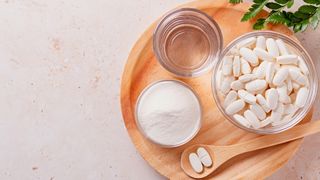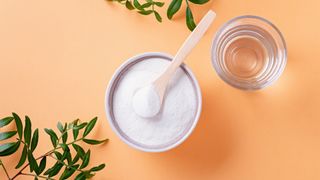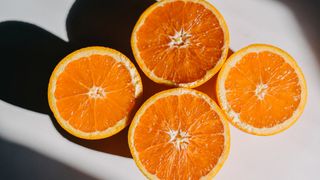Does vegan collagen actually work?
We've asked the experts everything you need to know about ‘vegan collagen’ and whether there’s any science behind this wellness trend

Plant-based lifestyles are getting increasingly popular and many health-conscious consumers are on the lookout for vegan and cruelty-free products. One recent trend in the beauty industry is food supplements and skincare products containing ‘vegan collagen’.
There are many grandiose claims to vegan collagen products, including a more youthful appearance, wrinkle reduction, stronger hair and healthier joints. But does ‘vegan collagen’ live up to its promises – and can collagen actually be plant-based?
Collagen is a structural protein found in the skin, bones, joints and muscles of animals. It gives strength and elasticity to our tissues, protecting our internal organs and helping us to move pain-free. Studies have shown that consuming hydrolyzed collagen may be effective in reducing the appearance of wrinkles and improving skin hydration. But since collagen doesn’t exist in the plant-based world, you may be wondering what ‘vegan collagen’ actually means and whether it can provide similar benefits. We asked the experts.
Can collagen be vegan?
All the experts Live Science consulted are in agreement – collagen can’t be vegan. “There is no natural source of collagen, it can only be found in animals or artificially synthesized in bacteria,” says Kevin Herbert, a medical physicist for 28dayskin. “Vegan collagen is normally a marketing term for plant-based ingredients which help your own collagen production, also known as ‘collagen promoters’.”
These ingredients, he says, include amino acids, ceramides, minerals (like copper), and antioxidants like vitamin C which help to fuel collagen production.
“Copper and vitamin C are critical components of collagen production,” he adds. “Other ingredients like silica also help catalyze collagen production.”
Pupinder Ghatora, a pharmacist and CEO of Ingenious, agrees, noting that some brands selling vegan collagen products may be misleading their customers. “There is no such thing as vegan collagen, this structure does not exist in the plant genome,” he says. “These products merely contain the amino acids that make up the structure of collagen, you can liken it to being given building blocks and told to produce a structure – each individual will produce a different structure. There is very little chance that the amino acid ‘blocks’ given in these brands will become a collagen molecule.”

Still, collagen made from genetically modified yeast and bacteria could be considered vegan as it doesn’t involve cruelty towards animals. This technique is relatively new, but thanks to recent advances, using microbes to produce vegan collagen may soon become more commonplace.
Scientists are particularly interested in utilizing Streptococcus pyogenes bacteria. Studies have shown this particular strain of bacteria can produce enough collagen to be commercially viable.
“Even though it is made entirely from non-animal sources, the structure matches human collagen and may well prove to be a more sustainable way of producing collagen supplements,” says Sarah Carolides, nutritionist at Zooki.
But experts call for patience. “This science is still in its research infancy and is not yet widely available outside of the lab – so collagen produced this way is not something you'll find on the shelf of your local supermarket just yet,” says Kevin Herbert. He also points out the potential issues with the language used to describe these products. “The question is whether using microbes to produce collagen is ‘vegan’,” he says.
Does vegan collagen actually work?
To date, there are no peer-reviewed studies into the effects of microbial collagen on skin health and appearance. What’s more, expert opinions are divided.
“It's not entirely clear that animal collagen supplements really work – though there is some preliminary data that suggest improved skin elasticity and hydration – so I'm not sure about vegan collagen supplements,” says Dr. Julia Tzu, dermatologist, Founder and Medical Director of Wall Street Dermatology. “At this point, true vegan collagen supplements are not widely available, and are mostly vegan collagen promoters, the efficacy of which also lacks solid data.”
On the other hand, diet experts point out that vegan collagen promoters can still bring some benefits. “Our body makes its own collagen, but production can decline from the age of approximately 25,” says Shona Wilkinson, a nutritionist at NutriGums. “Anything we can do to help this collagen production will be beneficial. This includes getting enough protein and nutrients into our body to help with the manufacturing of collagen.”

There are studies showing that vitamin C, the main ingredient in many vegan collagen promoters, may increase the production of collagen, accelerate bone healing and reduce the levels of free radicals in the body. Free radicals have the ability to damage skin tissues and speed up the aging process, so taking antioxidants may protect your skin from the negative effects of oxidative stress. Another common ingredient in these products, collagen peptides, have also been found to help with collagen synthesis. Furthermore, other common compounds like copper and silica could contribute to better skin health and more youthful appearance.
So do vegan collagen promoters actually work? “What you define as ‘working’ is pretty subjective,” says Kevin Herbert. “If you mean ‘does vegan collagen help raise the levels of collagen in your body?’ then the answer is yes, but no more than other supplements would do. So if you take it that each ingredient in a ‘vegan collagen’ supplement has the power to help support our natural collagen production, then it stands that combining them into a single capsule will produce a similar result.”
Vegan collagen: topical vs ingested
Considering that collagen products can be beneficial to our skin, is it better to ingest them with dietary sources or apply them topically?
Herbert doubts whether skincare products that contain collagen particles help boost collagen production. “Collagen is a long and very large molecule like Linguine pasta,” he says. “Our skin is designed to stop pollutants and bacteria penetrating into our bodies, and to stop the water in our bodies evaporating away. This means it is a very effective barrier at stopping large molecules like collagen getting through our skin layers and into the bloodstream, where ultimately the blocks which make up collagen need to get to in order to help the body fuel collagen production.”
Wilkinson agrees. “There is doubt about whether collagen can be absorbed through the skin,” she says. “Topical collagen has been shown to moisturize the skin but not to stimulate collagen production or provide a collagen source for the body,” she says.

At the same time, ingesting collagen may also prove problematic. “Collagen has to be digested and broken down into its building blocks – amino acids – before it's of any use in our bodies,” says Herbert. Since our bodies use amino acids according to their current individual needs, in many cases they may not be used for collagen production.
Would vegan collagen promoters, products which do not contain collagen particles, behave in a similar way? “Both formulations have their place in the health of the skin,” says Ghatora. “Collagen peptides themselves are too large in most cases to get through the skin, so topically collagen containing creams probably have little benefit. However, to hydrate the skin, topicals are excellent.”
Still, he advises to always choose skincare products that have been independently clinically proven. “Most brands use their active ingredient supplier data. Once formulated into an end product, the behavior of the said active may not replicate what is shown in the active ingredient supplier trial. Therefore it is essential that you check if a supplement has had an independent clinical trial carried out specifically on its formulation.”
Animal collagen vs vegan collagen
Experts' opinions are divided, but they tend to favor animal collagen over vegan collagen promoters.
“The only type of collagen available is animal based, either bovine or marine,” says Pupinder Ghatora. “In my view and from our research, marine collagen peptides are of a higher quality and more effective, especially when they are protected. Effective collagen supplement needs to be marine based, protected from the action of the stomach and independently clinically proven.”
Herbert adds: “Vegan collagen supplements cannot provide the body with actual collagen and they are generally less effective than animal-based collagens for building collagen, like for like.”
Sign up for the Live Science daily newsletter now
Get the world’s most fascinating discoveries delivered straight to your inbox.

Anna Gora is a health writer at Live Science, having previously worked across Coach, Fit&Well, T3, TechRadar and Tom's Guide. She is a certified personal trainer, nutritionist and health coach with nearly 10 years of professional experience. Anna holds a Bachelor's degree in Nutrition from the Warsaw University of Life Sciences, a Master’s degree in Nutrition, Physical Activity & Public Health from the University of Bristol, as well as various health coaching certificates. She is passionate about empowering people to live a healthy lifestyle and promoting the benefits of a plant-based diet.

Indian Ocean gravity hole: The dent in Earth's gravitational field created by the death of an ancient ocean

World's 1st silicon anode EV battery will let you drive up to 186 miles after just 5 minutes of charging

'Impossible' black holes discovered by the James Webb telescope may finally have an explanation